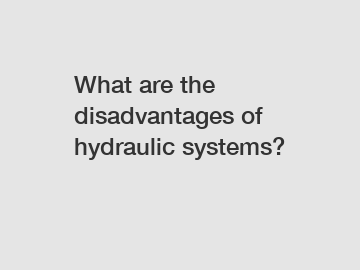What are the disadvantages of hydraulic systems?
What are the Disadvantages of Hydraulic Systems?
Hydraulic systems have been widely used in various industries for decades due to their ability to transmit power through fluid pressure. These systems are renowned for their reliability, efficiency, and versatility. However, just like any other technology, hydraulic systems also have their disadvantages. This article will explore some of the drawbacks that come with the use of hydraulic systems. .
1. Leakage: One of the primary disadvantages of hydraulic systems is the potential for leakage. Hydraulic systems rely on seals and connections to prevent fluid from escaping. However, these seals can deteriorate over time, leading to leaks. If left unaddressed, leaks can cause a loss of hydraulic fluid, compromised system performance, and even environmental contamination. Regular maintenance and inspection are necessary to minimize the risk of leakage.

2. High maintenance requirements: Hydraulic systems require regular and meticulous maintenance. Fluid levels need to be checked and replenished, filters need to be replaced, and seals need to be inspected. Failure to perform these maintenance tasks can result in decreased system efficiency, increased wear and tear, and eventual component failure. The need for continuous maintenance can be both time-consuming and expensive.
3. Fluid compatibility issues: Hydraulic systems operate using various types of hydraulic fluids. However, not all hydraulic fluids are compatible with each other or with the materials used within the system. Mixing incompatible fluids or using the wrong fluid can lead to chemical reactions, seal degradation, and overall system failure. It is crucial to select the appropriate hydraulic fluid for the specific system to avoid compatibility issues.
4. Noise and vibration: Another drawback of hydraulic systems is the potential for noise and vibration. The movement of fluid through the system, especially at high pressures, can generate considerable noise and vibration. This can be disruptive to operators, cause discomfort, and even damage equipment over time. Proper design and maintenance can help minimize noise and vibration levels, but this remains a challenge in some applications.
5. High initial costs: Hydraulic systems typically require a significant upfront investment. The components, such as pumps, cylinders, valves, and fluid reservoirs, can be expensive. Additionally, the complex design and manufacturing process of hydraulic systems contribute to their higher cost compared to other power transmission methods. This initial cost can be a barrier to entry, particularly for small businesses or startups.
6. Size and weight: Hydraulic systems tend to be larger and heavier than other power transmission systems. The need for bulky components, such as pumps, tanks, and pipes, makes hydraulic systems less suitable for applications where space and weight are critical factors, such as in aerospace or automotive industries. The size and weight of hydraulic systems can limit their versatility and adaptability in certain circumstances.
In conclusion, while hydraulic systems offer numerous advantages in terms of power transmission, they are not without their disadvantages. Leakage, high maintenance requirements, fluid compatibility issues, noise and vibration, high initial costs, and size and weight limitations are some of the drawbacks associated with hydraulic systems. Understanding and addressing these disadvantages is crucial for the efficient and reliable operation of hydraulic systems.
If you have further questions or need assistance with hydraulic systems, please do not hesitate to contact us. Our team of experts is ready to provide the support and guidance you need.
If you want to learn more, please visit our website dual action cylinder solution, Metallurgical Custom Hydraulic Cylinder Manufacturer in China, Vertical Casting Hydraulic Cylinder.


